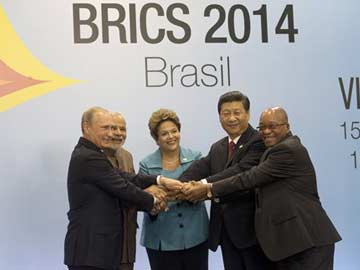India Rules BRICs
as Modi Scores Big
in Investor Poll

A woman walks past a large screen showing television coverage of India's prime minister Narendra Modi, during the Indian general election, in the lobby of the Bombay Stock Exchange (BSE) in Mumbai, on Friday, May 16, 2014. India’s S&P BSE Sensex index has surged 21 percent this year on optimism Modi’s pledges to cut red tape and attract investment will boost Asia’s third-largest economy after growth slowed to near a decade low. Photographer: Vivek Prakash/Bloomberg
Modi mania is taking hold across global markets.
Financial professionals are now more bullish on India relative to the largest emerging markets than at any point in the past five years after Narendra Modi scored the biggest election victory in three decades, giving him a mandate to revive economic growth as prime minister.
Twenty-three percent of respondents in the Bloomberg Global Poll said India offers one of the best investment opportunities among eight of the biggest markets worldwide, versus the 12 percent average for the other so-called BRIC nations, or Brazil, Russia and China. (SHCOMP) That gap is the widest since the survey began in 2009. Fifty-one percent are optimistic on Modi’s policies while those in favor of Brazil President Dilma Rousseff’s sank to a record 11 percent.
“The mandate that Modi has really gives you optimism that India will finally make their political process more efficient and be able to tackle their infrastructure issues to unlock the country’s potential,” said Andrew Douglas, who oversees about $2 billion as the chief investment officer of the wealth management group at Dubuque, Iowa-based Heartland Financial USA Inc. and participated in the poll. “Brazil seems to be doing everything wrong.”
Red Tape
India’s S&P BSE Sensex (SENSEX) index has surged 21 percent this year on optimism Modi’s pledges to cut red tape and attract investment will boost Asia’s third-largest economy after growth slowed to near a decade low. Exchange-traded funds that invest in the country lured more inflows than any other emerging market this year, while investors pulled money from Brazil as the economy sunk into stagflation under Rousseff’s watch.
The MSCI Emerging Markets Index has gained 6 percent this year, fueled by signs of a recovery in the Chinese economy and as concern eased that rising borrowing costs in the U.S. will spur capital outflows. Forty-eight percent of respondents in the Bloomberg poll said the developing-nation stock index will climb in the next six months, versus 27 percent who said it will fall. The poll of 562 Bloomberg users was conducted July 15 and 16 by Selzer & Co., a Des Moines, Iowa-based firm, and has a margin of error of plus or minus 4.1 percentage points.

India To Head BRICS'
$100 Billion New
Development Bank
Fortaleza, Brazil:: Leaders of the BRICS emerging market
nations launched a $100 billion development bank and a currency
reserve pool on Tuesday in their first concrete step toward
reshaping the Western-dominated international financial system.
The bank, aimed at funding infrastructure projects in developing
nations, will be based in Shanghai, China, and India will preside
over its operations for the first six years, followed by five-year
terms for Brazil and then Russia, leaders of the five-country group
announced at the 6th BRICS - Brazil, Russia, India, China and
South Africa - summit. (BRICS Victory for India: Your 10-Point
The member countries will also set up a $100 billion currency
reserves pool to help countries forestall short-term liquidity
pressures.
For India, it was a moment of success after hard bargaining to
settle
where the bank would be located and the share-holding in it. The
bank will be called the New Development Bank, a name suggested
by Prime Minster Narendra Modi. (The Biggest Challenge for
BRICS Success? Big Brother China)
Also, the bank will begin with a subscribed capital of $50 billion
Also, the bank will begin with a subscribed capital of $50 billion
divided equally between its five founders; China, the world's
number 2 economy, had argued that the economic strength of a
member nation should be the criteria for contribution to the bank -
a higher contribution would automatically mean greater control.
But
in intense negotiations that delayed the bank for two years, India
and Brazil fought China's attempts to get a bigger share in the
lender than the others. (Read: Foreign Media on BRICS New
Development Bank)
"The agreement towards setting up the BRICS New Development
"The agreement towards setting up the BRICS New Development
Bank is a significant step. I am happy the initiative announced in
2012 in Delhi has become a reality," PM Modi said. The summit is
Mr Modi's first multilateral engagement since he took over as
Prime
Minister in May this year. (BRICS: PM Pitches for 'Zero
Tolerance' Towards Terror)
The long-awaited bank is the first major achievement of the BRICS
The long-awaited bank is the first major achievement of the BRICS
countries since they got together in 2009 to press for a bigger say
in
the global financial order created by Western powers after World
War Two and centered on the International Monetary Fund and
the
World Bank.
The BRICS were prompted to seek coordinated action following an
The BRICS were prompted to seek coordinated action following an
exodus of capital from emerging markets last year, triggered by the
scaling back of US monetary stimulus. The new bank reflects the
growing influence of the BRICS, which account for almost half the
world's population and about one-fifth of global economic output.
कोई टिप्पणी नहीं:
एक टिप्पणी भेजें